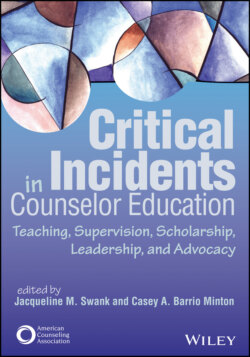Читать книгу Critical Incidents in Counselor Education - Группа авторов - Страница 9
Оглавление
Preface
Counselor educators have multiple roles and responsibilities as teachers, supervisors, scholars, leaders, and advocates for the counseling profession. Doctoral programs in counselor education and supervision have the challenging task of preparing students to embrace each of these roles with all their complexities. Despite rigorous instruction and experiential learning opportunities, counselor educators and supervisors, especially those new to their roles, often struggle with complex situations that they feel unprepared to address.
The challenging, complex critical incidents counselor educators navigate within their multiple roles become learning opportunities for growth and development. As we have trained and mentored counselor education doctoral students and new counselor educators, as well as reflected on our own experiences as counselor educators, we have been reminded of the similarities in the challenging situations we have experienced. Learning from others’ experiences may help aspiring and new counselor educators and supervisors avoid pitfalls in addressing similar situations. Thus, we designed this book to help you navigate critical incidents commonly experienced in counselor education and supervision. The cases are largely fictitious or composites, but the situations are real and are experienced by counselor educators frequently in their work settings.
This book focuses on critical incidents experienced by counselor educators across four unique areas in which they must develop specialty skills: (a) teaching, (b) supervision, (c) research and scholarship, and (d) leadership and advocacy. Within each chapter, experts in counselor education identify key issues relevant to the case; analyze the critical incident with overt attention to the ACA Code of Ethics (American Counseling Association, 2014), existing literature, and diversity and inclusion; and discuss actions and outcomes. Experts also provide a response for each chapter that focuses on reinforcing decisions made, introducing additional literature, and providing contrasting opinions.
The first part is focused on teaching and includes 13 chapters within three sections: (a) student engagement and dispositions, (b) dynamics related to diversity and inclusion, and (c) instructor preparedness. The second part is related to supervision and encompasses nine chapters within three sections: (a) supervisee dispositions and behaviors, (b) issues with site supervisors, and (c) doctoral student supervisors. The third part pertains to research and scholarship and includes nine chapters within three sections: (a) collaboration and authorship, (b) client interest and well-being, and (c) the publication process. The final part focuses on leadership and advocacy and includes nine chapters within three sections: (a) professional organization leadership, (b) leadership and advocacy in the local community, and (c) diversity and inclusion within counselor education programs.
We expect you will find the stories and analyses helpful in multiple ways. Counselor educators may use this book throughout the doctoral curriculum in courses focused on each of the four domains as well as in more general professional orientation and ethics courses or internships. This will provide an opportunity to facilitate exploration of critical issues commonly experienced in counselor education and supervision. These conversations may help students develop an understanding of the complexities of the roles of counselor educators and supervisors. We expect counselor educators and supervisors will see themselves in many of the stories, perhaps using the book to explore multiple perspectives on common critical incidents they find themselves navigating.
The authors address challenges and opportunities counselor educators must navigate on an ongoing basis. The book also focuses on integrating multicultural and social justice issues through the inclusion of diverse counselor educators as authors, the inclusion of diverse individuals within the scenarios, and overt discussion of cultural dynamics and considerations across topics and issues. This book supplements existing textbooks within each of the four domains by focusing on real-world application of theories, concepts, and techniques. In sum, we believe you will find the book beneficial for preparing counselor education doctoral students and fostering the further growth and development of practicing counselor educators and supervisors.
